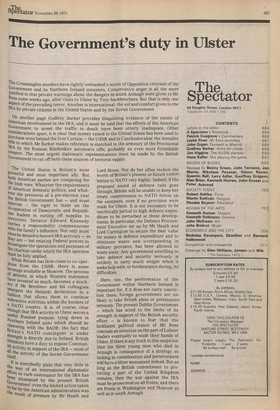The Government's duty in Ulster
The Crossmaglen murders have rightly unleashed a storm of Opposition criticism of the Government and its Northern Ireland ministers. Conservative anger is all the more justified in that private warnings about the dangers in south Armagh were given to Mr Rees some weeks ago, after visits to Ulster by Tory backbenchers. But that is only one aspect of the prevailing terror. Another is international: the aid and comfort given to the MA by private citizens in the United States and by the Soviet Government.
On another page Godfrey Barker provides disquieting evidence of the extent of American involvement in the IRA, and it must be said that the efforts of the American Government to arrest the traffic in death have been utterly inadequate. Other Considerations apart, it is clear that money raised in the United States has been used to Purchase arms behind the Iron Curtain – the USSR and in Czechoslovakia: the Armalite line to which Mr Barker makes reference is matched in the armoury of the Provisional IRA by the Russian Klashnikov automatic rifle, probably an even more formidable _Weapon. The most urgent diplomatic representations must be made by the British Government to cut off both these sources of terrorist supply.
The United States is Britain's most Powerful and most important ally. But both American parties are competing for the Irish vote. Whatever the requirements of American domestic politics, and whatever the pressures of a pre-election year the British Government has – and must exercise – the right to insist on the co-operation of Democratic and Republican leaders in cutting off supplies to terrorists. Senator Edward Kennedy Carries a responsibility commensurate with his family's influence. Not only must visas be denied to known IRA activists — as they are – but existing Federal powers to investigate the operations and purposes of the charities under which the IRA operates must be fully applied. While Britain has little claim to co-operation from the USSR, there is some leverage available in Moscow. The process of detente, in which Western statesmen have invested so much, becomes a mockerY if Mr Brezhnev and his colleagues interpret the Helsinki declaration in a fashion that allows them to continue subversive activities within the borders of a NATO country. It is, of course, clear enough that IRA activity in Ulster serves a useful Russian purpose, tying down in Northern Ireland units which should be oPerating with the BAOR: the fact that Britain's NATO contingent is under strength is directly due to Ireland. British Ministers have a duty to expose Communist activity in support of the IRA – most of all the activity of the Soviet Government itself.
It is wretchedly plain that very little in the way of an international diplomatic been to curb sustenance for the IRA has peen attempted by the present British Government: even the limited action taken so far by the American administration was the result of pressure by Mr Heath and Lord Home. Nor do her allies reckon the worth of Britain's present or future contribution to NATO very highly. Indeed, if the proposed round of defence cuts goes through, Britain will be unable to keep her treaty commitments to NATO forces on the continent, even if no provision were made for Ulster. It is not necessary to be uncritically partial to high defence expenditure to be perturbed at these developments. In particular, the Defence Procurement Executive set up by Mr Heath and Lord Carrington to secure the best value for money in defence expenditure and to eliminate waste and overspending in military provision, has been allowed to waste away. Any government unwilling to take defence and security seriously is unlikely to carry much weight when it seeks help with, or forebearance during, its difficulties.
Here, too, the performance of the Government within Northern Ireland is important for, if it does not carry conviction there, foreign governments are unlikely to take British pleas or pretensions seriously. The present Dublin Government – which has acted to the limits of its strength in support of the British security effort – is known to fear that the lacklustre political stance of Mr Rees conceals an intention on the part of Labour leaders eventually to wash their hands of Ulster. If there is any truth in this suspicion then the three young men who died in Armagh in consequence of a strategy so lacking in consideration and perseverance will have a bitter monument indeed. But as long as the British commitment to protecting a part of the United Kingdom remains, then the war against the IRA must be prosecuted on all fronts; and there are fronts in Washington and Moscow as well as in south Armagh.


































 Previous page
Previous page